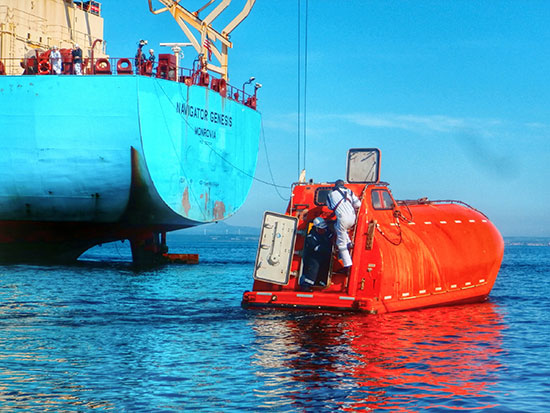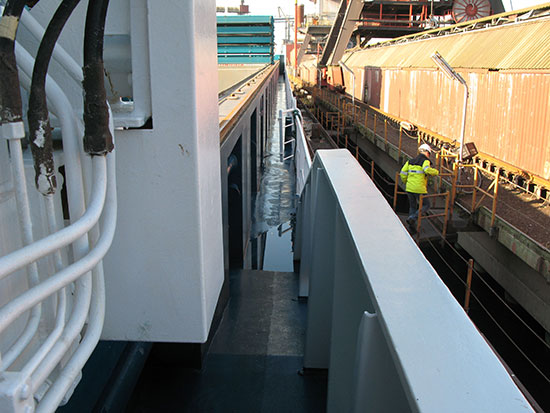- Topics
- Campaigning
- Careers
- Colleges
- Community
- Education and training
- Environment
- Equality
- Federation
- General secretary message
- Government
- Health and safety
- History
- Industrial
- International
- Law
- Members at work
- Nautilus news
- Nautilus partnerships
- Netherlands
- Open days
- Opinion
- Organising
- Podcasts from Nautilus
- Sponsored content
- Switzerland
- Technology
- Ukraine
- United Kingdom
- Welfare
A dangerous precedent: failures in enforcing regulations are putting seafarers' lives at risk
18 August 2020

Nautilus has previously reported on how some seafarers are illegally being denied their Maritime Labour Convention rights to crew relief and repatriation during the coronavirus pandemic. Now we turn to further violations of international treaties, highlighting Port State Control failures to enforce safety and security regulations that could lead to unsafe ships returning to our waters, both in the months to come and longer-term. Helen Kelly reports
Maritime safety experts are flagging up growing concerns over the failure of maritime authorities to enforce international safety and security regulations during the coronavirus pandemic, which some fear could lead to dangerously unsafe vessels plying the world's oceans and put seafarers' lives at risk.
Industry regulator, the International Maritime Organization (IMO) has issued several circular letters to facilitate the continuous movement of world trade during the pandemic by ensuring smooth operations of ships with 'practical and pragmatic' approaches. But worryingly, due to the different interpretations by stakeholders – governments, flag states, port states, classification societies, ship owners and companies – in many cases safe ship operations have been deprioritised, endangering the safety of maritime workers and the marine environment, according to the International Transport Workers' Federation (ITF).
ITF maritime co-ordinator Jacqueline Smith said: 'The ITF is deeply concerned that the work that has been achieved over decades, and the international regulations that have been implemented, are being undermined out of convenience and no longer because of necessity as it was in the beginning of the pandemic. Such practices are setting a dangerous precedent that could continue, putting maritime workers' lives and safety in jeopardy.'
The main areas of concern flagged by the ITF are:
- safety and security of maritime workers
- safe manning
- hours of rest
- extension of ships' and seafarers' certificates
- environmental protection regulations and maritime workers' safety
- promoting the use of computer based training (CBT) for onboard safety and security training
- use of remote inspections
The ITF will integrate these concerns into its 'Enough is Enough' campaign, launched in June 2020 to protest against the ongoing crew change crisis that now affects an estimated 300,000 seafarers stuck onboard due to pandemic travel restrictions, and another 300,000 seafarers stuck at home unable to access employment onboard.
'We have an obligation and responsibility to the seafarers to say "enough is enough" to reduced safety and security, to reduced manning, to reduced hours of rest and to added responsibilities beyond their duties – all of these factors are threatening the lives of the seafarers,' Ms Smith said.
We now need to restart ship inspections so that we can be sure the regulations that were put in place for a reason are being complied with Nautilus International professional and technical officer David Appleton
Bigger than Covid
When the Covid-19 pandemic first hit, many countries shut their borders and travel restrictions were imposed. It was accepted that the industry faced a 'force majeure' situation and that processes and protocols would need to be reconsidered. As a result, many ports were closed, and ships denied entry.
Force majeure is defined as acts, events or circumstances beyond control, and can release parties from contractual or regulatory obligations.

Many maritime authorities chose to develop temporary guidance to Port State Control (PSC) to apply flexibly during the pandemic. Most approved delays to or extensions of ship inspections, surveys and audits for between three and six months. Routine servicing of lifesaving and firefighting apparatus, dry docking and in water surveys, testing of lifting appliances and loose gear, and ballast water and bunker fuel inspections, among very many others, were all put on hold.
In a 9 April IMO video meeting with PSC regimes, the 10 regimes all reported suspensions and or delays to ship inspections. The regimes include the United States Coast Guard, the Viña del Mar Agreement and the Abuja, Black Sea, Caribbean, Indian Ocean, Mediterranean, Paris, Riyadh and Tokyo Memoranda of Understanding (MoUs) on PSC.
'We now have a bigger crisis than the Covid-19 crisis to fight, and that is a crisis of regulation, because every country can now do what they want to do in terms of safety,' says Odd Rune Malterud, assistant director & technical manager of the Norwegian Union of Marine Engineers – a member of the Nautilus Federation.
'The port state administrations keep talking about maintaining smooth operations, and they don't even mention safety. This is a big problem.'
Mr Malterud fears exemptions granted in exceptional times will become permanent without consultation with unions or seafarers.
His sentiment is echoed by Nautilus International professional and technical officer David Appleton, who has seen several proposals from the UK Maritime and Coastguard Agency (MCA) to make Seafarer Employment Agreement (SEA) repatriation exemptions permanent, including 60-day extensions to seafarers' contracts, and the permanent use of remote ship inspections.
'We need to create a balance between making practical allowances for the situation we're in and making sure that these don't become permanent,' he says.
'The rules are written for a reason. When it becomes inconvenient to comply with the rules, you don't change the rules.'
Remote ship inspections
During the pandemic, several maritime authorities encouraged remote ship inspections in order to safeguard crew and shore-based employees, including two key members of the IMO Council – the USA and Norway. The IMO Council is the executive arm of the United Nations body.
In a 19 June circular, the Norwegian Maritime Authority said: 'There are reasons to believe that the Covid-19 pandemic and subsequent restrictions imposed will continue for quite some time.

'The Norwegian Maritime Authority (the NMA) has therefore opted to expand the possibility of carrying out remote audits to include DOC, SMC and ISPS audits and MLC inspections in cases where it is not possible to conduct physical audits or inspections on board the vessel or at the company's office due to restrictions or the risk of infection.'
The problem is that remote ship inspections require onboard crew to assist shoreside operators to complete the examinations – a significant increase in workload for already fatigued seafarers.
Mr Malterud, a former chief engineer and ship inspector, highlights that as a massive problem. 'It is a huge safety and security risk to eliminate Port State Control,' he says.
'If you are on a ship you don't see your own deficiencies. You need fresh eyes.'
Accident in waiting
Some now fear that a major maritime incident will need to occur before the industry wakes up to the risks of long-term regulatory erosion sparked by the pandemic.
In its latest annual Safety & Shipping Review, the insurance firm Allianz Global Corporate & Specialty (AGCS) suggests that a damaging combination of economic downturn, cost-cutting measures, fatigued crew and weakened emergency response could see a surge of accidents at sea. AGCS said the coronavirus pandemic has resulted in a sharp reduction in global seaborne trade and warned that the economic fallout could unwind years of safety gains.
The worry is that even when countries do restart PSC, many maritime administrations are moving too slowly to re-introduce effective regulatory enforcement.
The UK suspended PSC inspections in March. Maritime and Coastguard (MCA) Surveyors suspended routine survey and inspection activity for UK flagged vessels either domestically or overseas. And while the MCA resumed survey, audit and inspection activity on 20 July, 'not all activities recommenced on this date'.

The Netherlands also suspended PSC inspections in March, with a phased return to operations from early July. However, only in rare cases will inspectors now go onboard ship.
Nautilus has raised its concerns about regulatory non-compliance with several industry partners including the Merchant Navy Welfare Board and the MCA.
'We now need to restart ship inspections so that we can be sure the regulations that were put in place for a reason are being complied with,' Mr Appleton said.
Tags
More articles
Insurer sees surge of ship accidents on horizon as pandemic puts squeeze on safety measures
TS-Shipping told to review emergency response following MAIB report into grounding of Thea II
The container vessel was on its way from Amsterdam bound for Hull in December 2018, when it ran aground in the approaches to the Humber Estuary.
MAIB questions IMO cargo misdeclarations measures following Ever Smart investigation
Concerns over the effectiveness of International Maritime Organization (IMO) measures to tackle the dangers posed by misdeclared and overloaded containers have been raised by the UK Marine Accident Investigation Branch (MAIB).
No more excuses on crew change crisis
Panama defies seafarers rights
Blacklisting call for Panama flagged ships as seafarers told to stay onboard longer
Nautilus International has called for all Panama flagged ships to be targeted for inspection by Port State Control and detained for breaching the Maritime Labour Convention when entering their country in response to its 'inhumane' extension of Seafarer contracts.
